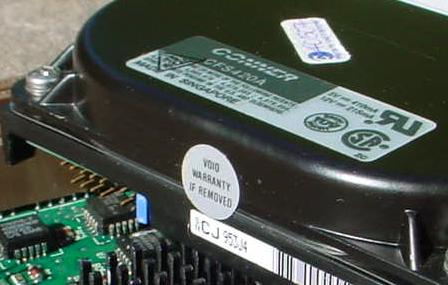
Photo: Red Hill.
Conner CFS 420A
Typical Conner: solid, reliable, not very fast. We sold a moderate number new and traded countless others in for years afterwards; they were one of the most common second-hand drives around for a long, long time in the nineties.
I pulled the one illustrated out of a working machine just last month — perhaps almost the last one, for (as I revise these pages once again) it is March 2002 already and the useful life of slow 420s must be surely over.
As the years passed, the CFS 420s seemed slower than ever. They proved to be remarkably reliable in the longer-term: they had their share of failures early on but troubles became quite rare after the first year or two. Just the same, better-performed drives of the same era — the Western Digital 420s and the Seagate Decathlon 850s for example — aged much more gracefully.
Like most Conners, these had an arcane jumper setup and could be ridiculously difficult to master/slave. This was a major issue in those days — it was before dual IDE controllers became common and upgrades almost always involved an external Backpack drive or master/slaving.
An IBM or Western Digital drive to transfer data off brought smiles in the workshop, Seagates and Maxtors and Quantums were OK, opening the soon-to-be upgraded box to find a Conner drive made for groans and curses. There was no Internet to speak of in those days, and jumper settings were not marked on the drives themselves: you just had to know. With most brands it was fairly easy to figure out, but with the Conners nearly every damn drive was strapped a different way. Knowing how to set a CFA 170A was no help at all if you were trying to work with a CP 30084 or a CFS 420A. Conner was swallowed up by Seagate in 1996 and Conner drives went out of production. We didn't miss them.
| Performance | 0.64 | Reliability | AA1 |
| Data rate | 32 Mbit/sec | Spin rate | 3600 RPM |
| Seek time | 14ms | Buffer | 32k |
| Platter capacity | 210MB | Interface | IDE mode 2 |
| Actuator | voice coil | Form | 3½" 1/3 height> |
| CFS420A | 426.8MB | 4 thin-film heads | *** |